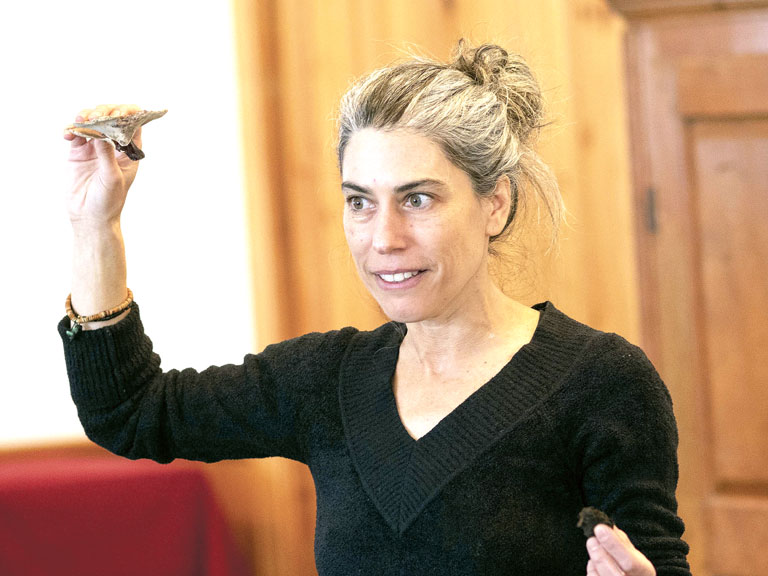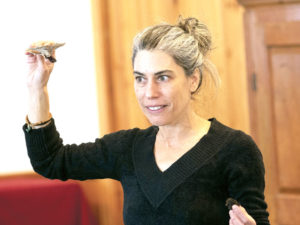County News
Building Resilience

Plant-based medicines offer many health benefits
Herbalist Tamara Segal has devoted her life to studying plant medicines. She has an extensive knowledge of plants and their healing properties, and she shares her expertise through her work as a Registered Herbalist operating out of a clinic in Belleville, as well as through workshops and educational tours. She has been trained to work alongside the conventional medical system, so that any herbal remedy she recommends for her clients is compatible with the pharmaceutical drugs they may be taking. While her approach includes treating the symptoms and addressing the causes, it is part of a larger picture that encompasses the body, mind and emotions to bring a client’s health back into balance. Tamara sees the environment as an intricately connected entity, of which humans are a part. There is a network that extends from microbes and fungi in the soil, to tree and plant roots, to leaves, flowers and fruits, and to insects, animals and people. She says that nature always tries to find a balance, and responds whenever things are thrown out of kilter. Those coping mechanisms, particularly the ones used by plants as they create chemicals and substances to help them thrive in challenging situations, form the basis of how herbal remedies are used to treat or alleviate illnesses. Last Sunday afternoon Tamara gave a presentation at The Grange of Prince Edward Winery on how wild plants and common kitchen herbs can be used to build resiliency and strengthen an immune system that is compromised by daily stresses or by changes in the environment.

Herbalist Tamara Segal speaks about the healing properties of reishi mushrooms and other wild plants at The Grange of Prince Edward Winery.
“The idea of resilience has to do with being able to respond to a challenge and to keep ourselves healthy, and the way I think of the immune system is that it is the embodiment of resilience,” said Tamara. “It’s about getting to know what the challenges are and having defences for it. We’ve all experienced illness to some extent, from viruses and microbes, and our immune system gets to know that particular virus attacking us, and it won’t be able to attack us again. But the microbes are ever-changing, so there’s this idea of an intelligence that is prevalent among the microbes, among our bodies, and our immune system. The way I see it, this is a kind of vital force that is present within the earth as an organism, and some of that is helpful to us and we can live symbiotically with it, and there is the other that we need to defend ourselves against.” She went on to add that as the level of toxins and chemicals rise in our environment, the body’s ability to cope becomes diminished. “More toxicity means more foreign stuff your immune system has to respond to, so when you are faced with an infection your immune system may not be as strong as it would be otherwise.”
Tamara explained how certain herbal remedies can help restore the immune system, giving the example that wild mushrooms such as reishi and chaga mushrooms can help support metabolism and boost immunity. She did caution against harvesting wild mushrooms unless people were extremely sure of what they were doing, and said that grocery store mushrooms had very similar health benefits at a much lower risk. Roots of the much-maligned dandelion, chicory or burdock also help to build immunity, and act as digestive aids by triggering enzyme production and supporting beneficial gut microbes. Even regular kitchen herbs can be used as medicines.
A tea made with thyme is good for the respiratory system, oil of oregano has healing properties, and rosemary helps with circulation and can improve brain function. Beyond the use of herbal medicines, a key component for Tamara in ensuring her clients’ well-being is fostering an awareness of their own health. “The idea of communication from my perspective is crucial in terms of keeping ourselves healthy,” she said. “In general, being able to check in with yourself daily and with how you are actually feeling—whether it’s through meditation, or keeping a journal, or in a yoga practice where you tuning-in different parts of your body, or just having a conversation with others— so that you are aware of what is going on with your body.”
Sunday’s presentation was part of the “Wine and Wellness” month at the winery. Owner Caroline Granger was thrilled to have Tamara do the presentation, since she has taken a number of Tamara’s courses, and is applying some of the principles she learned there to the operation of the winery. “I have used plants and herbs for healing with my own family for over a decade,” she said. “I am integrating a more holistic and regenerative atmosphere on the farm, and using more of what grows with the vines to promote the health of the vines. And with this last vintage, I started using wild-grown plants— New England aster and sumac—in two of the wines I am making, making them true botanical tonic wines.” She was also happy the presentation was used as a fundraiser for Alternatives for Women, of which she has been the chair for 20 years. They have just received the occupancy certificate for Vi’s House, the new transitional and emergency housing for women in crisis, and will be holding an open house at the facility in February. For more information about medicines derived from plants and herbs, and to find out about upcoming courses, please visit hawthornherbals. com.

Comments (0)